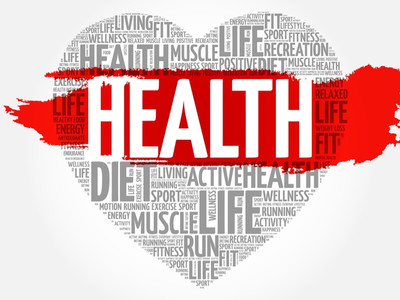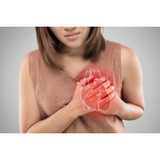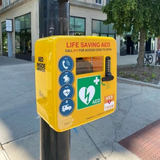Does a defibrillator restart a stopped heart?
Chances are you have seen or heard of a defibrillator but, do you know what they are used for and how? Defibrillators are used for sudden cardiac arrests however, it can be confusing knowing the difference between a heart attack and a cardiac arrest, as well as knowing when to use one.
You have probably seen a defibrillator installed in your local village, at your office, in the supermarkets, or, in your nearby sports facility but, have you always wondered why the are so important and what they are needed for? To help, we have written this blog to help clarify a few questions and answer a significant question; does a defibrillator restart a stopped heart?
When do you need a defibrillator?
When someone suffers from a sudden cardiac arrest, they require a defibrillator. Cardiac arrests are often confused with a heart attached but, are very different. A sudden cardiac arrest is caused by an electrical fault within the hearts rhythm which causes a victim to fall unconscious within a matter of seconds. Their heart will begin beating irregularly and if care isn’t delivered within a matter of minutes, the likelihood of someone surviving is unfortunately very slim.
A heart attack is very different in this case as these are caused usually due to a blockage in the coronary artery. The patient will experience pain in the chest that spreads to their arms or neck.
It is important to know that you should use a defibrillator when someone suffers a sudden cardiac arrest. The person will be unconscious meaning you need to act as quickly as possible. Firstly, you need to call the emergency services, then begin CPR, whilst getting ready to use your defibrillator.
What does a defibrillator do?
Defibrillators scan the heart’s electrical rhythm and determine whether a shock is needed. If so, it will deliver one in order to save the patients life. Defibrillators are made specifically with ease of use in mind so don’t worry if you don’t have any medical training. All instructions are clearly presented on defibrillators including clear audio steps helping you through every stage of the process.
From attaching the electrode pads to the victims chest to carrying out CPR, defibrillators are life saving tools that help restore a person’s heart back to it’s natural rhythm.
There is however, not just one type of defibrillator, there are two to consider. One is a semi-automatic defibrillator and the other is an automatic external defibrillator (AED). Both work in the same way however, a semi-automatic defibrillator will alert you to push a button when a shock needs to be delivered where as an AED will deliver a shocks itself without you doing anything. It is important to remember that you cannot over-shock or cause more damage to someone when using a defibrillator. They will never deliver a shock unless one is needed.
Does an AED really restart a heart?
Surprising, an AED doesn’t actually restart a heart. It is one of the most common questions asked when it comes to defibrillators so probably comes as a surprise. This is because when someone suffers a sudden cardiac arrest, their heart starts to beat irregularly which is called fibrillation. Oxygenated blood is no longer being pumped around the body so in order to help the heart start beating regularly again, defibrillators stop the chaotic rhythm of the heart so that it can return to it’s natural beating rhythm on it’s own.
Sudden cardiac arrests can happen to anyone regardless of age, gender or ethnicity and can kill within a matter of minute. Having a defibrillator nearby can change this though. When out and about in your local park, gym, supermarket or when at work look out for where your nearest defibrillator is so that if the worst should happen, you know what action to take.
Recent Posts
-
What is CPR?
Knowing the basics of first aid and how to deliver CPR (cardiopulmonary resuscitation) can make the …17th Nov 2024 -
What is a sudden cardiac arrest (SCA)?
Sudden Cardiac Arrest (SCA) is a critical medical emergency where the heart abruptly ceases to funct …17th Nov 2024 -
Empowering Communities: The Lifesaving Impact of CPR on Restart a Heart Day
Every year, on and around October 16th, an important event takes place - Restart a Heart Day. This a …16th Oct 2023




